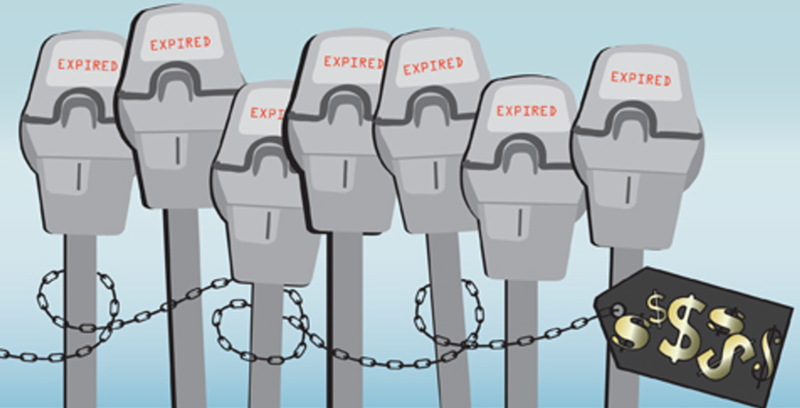The Greater Cincinnati Port Authority today acknowledged that it will increase enforcement when it takes over Cincinnati's parking meters, but the agency says its goal is to encourage people to pay up, not raise revenues that will make the parking lease more profitable for the Port Authority and the private operators it's hiring.
In a much-awaited presentation, the quasi-public development agency rolled out board members and statistics to explain why the city should lease its parking meters, lots and garages to the Port, which will hire various private companies to operate the assets.
Much of the controversy surrounding the lease has focused on enforcement, which critics argue will be ratcheted up under the deal. Port officials clarified that the deal will involve more enforcement officers and more aggressive tactics, but Laura Brunner, CEO of the Port, claimed there will be limits. For example, parking meters won't have built-in connectivity that allows officers to immediately detect when a meter is going unpaid, which means enforcers will have to make regular rounds and checks, just as they do today, before issuing a ticket.
Lynn Marmer, a Port board member and vice chairwoman of Kroger, said increased enforcement is necessary because most people currently don't pay for the parking services they use. She blamed that on the city's dwindling enforcement for parking violations: The city handed out 65,000 tickets in 2012, down from 104,000 in 2008.
"I think it's unlikely we all got better at following the rules and paying fines," Marmer said.
The Port doesn't expect enforcement to reach the levels of 2008 any time soon, but Brunner and others said that tickets will gradually rise once the Port Authority hands the parking meters over to private operators.
One of those private operators is Xerox, which will manage Cincinnati's parking meters under the deal. The Port says it plans to establish a 10-year contract with Xerox, but the contracts will be reviewed quarterly to ensure the company is doing a good job. If not, the contract can be terminated.
Port officials stated that Xerox will not get revenue based on stringent enforcement. Instead, the Port will regularly review Xerox based on a series of measurements that attempt to gauge how efficiently the company is running the city's parking meters.
Port officials also reemphasized that parking meter enforcement hours in neighborhoods — meaning outside of downtown and Over-the-Rhine — will only last until 6 p.m., instead of 9 p.m. as originally called for in the plan. Downtown and Over-the-Rhine meters will still be extended to 9 p.m., although some areas on the edges of downtown, such as Broadway Street, are exempt and enforcement will only run through 6 p.m. in those places.
The change for neighborhood meter hours will presumably lower how much Cincinnati gets from leasing its parking assets to the Port, but officials weren't ready to unveil exactly how much money the city will get. Previous city estimates put the lump sum at $92 million and annual installments at a minimum of $3 million, but that was before the Port's changes.
Prepared statements show if the final lump sum falls under $85 million, the city manager will need to approve the changes before the Port can move forward with the deal.
The decrease in hours also comes with a caveat: It will be possible for the city manager, Port and an independent board appointed by the Port and city manager to expand parking meter hours in the future. But such a change would require approval from all three governing bodies.
Ex-Councilman John Cranley, who's running for mayor and opposes the parking lease, says the Port's presentation did nothing to address his concerns. Claiming that "the devil's in the details," Cranley pointed out that the Port still hasn't released the actual contracts or bond documents.
Brunner said the documents should be released within a month, and the Port plans to give the public two weeks to review the details between the documents' release and the Port's final vote.
Cranley argued that might not be enough time. He told CityBeat that the city "almost gave away" free Sunday and holiday parking under its original lease agreement. Councilman P.G. Sittenfeld's office had to catch the error and refer it to the city administration before it was corrected.
The Port's presentation was meant to wrap up the agency's due diligence of the parking lease as it approaches a Sept. 4 deadline. Going into the presentation, Marmer explained, "Frankly, we were more skeptical (of the parking lease) than neutral."
Emails previously acquired by CityBeat back Marmer's skepticism. Writing to other Port officials in June, Marmer expressed concerns that the parking lease has been poorly handled and will snare the Port with controversy. "This whole parking issue has been a gigantic distraction from our core mission," she claimed.
Supporters of the parking lease argue it's necessary to leverage Cincinnati's parking assets to pay for development projects that will grow the city's tax base. Opponents argue it will take too much control out of the city's hands, cause parking rates and enforcement to skyrocket and hurt businesses and residents.
The parking lease has been engulfed in political controversy ever since it was announced in October. Most recently, the city administration was criticized for failing to disclose an independent consultant's memo that found the city was getting a bad deal from the lease. City officials argue the memo was outdated, so they didn't feel the need to release its details.
With its due diligence nearly finished, the Port will now finalize contracts, update the financial model for the lease and vote on the bonds and contracts that will complete the deal. If all goes as planned, the Port's new system will be in place by April next year.
This story was updated to clarify some wording and what parking meters will be enforced until 9 p.m.


